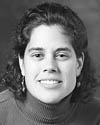Cornell's Casasola receives Presidential Early Career Award for research on language development and thought in young children

Marianella Casasola, the Lois and Mel Tukman Endowed Assistant Professor in Human Development at Cornell University, was awarded a Presidential Early Career Award for Science and Engineering (PECASE) at the White House, June 13, for her work on studying the connections between infant language and thought by examining how language inputs from the environment influence the way children form spatial categories.
Casasola's award is one of 20 that were given to young scientists and engineers whose work is supported by the National Science Foundation (NSF); PECASE awards are considered the highest national honor for investigators in the early stages of promising research careers.
"These young presidential awardees will lead our nation in science and engineering as they leap the fences, cross the boundaries and build new and exciting areas of science," said Arden L. Bement Jr., NSF director, at the ceremony. "They also pass on to many students their imaginative thinking built into creative educational activities in a form of leadership that can influence career choices and help invigorate the science and engineering enterprise."
Casasola's NSF award of $400,000 over five years is for research conducted in multiple languages and that builds on the idea that language is a powerful tool in directing the attention of young children and shaping the way they think.
"The aim of the research project is to document how young children acquire the semantic spatial categories that are specific to their language," Casasola explained. When English-learning toddlers, for example, learn the preposition "in," they apply it to all types of containment events, whereas Korean-learning toddlers learn a different word that only applies to tight-fitting containment and tight-fit support. "Thus, in acquiring spatial language, these toddlers respectively learn to attend to different types of spatial relations and learn to organize the same spatial events on a very different basis for linguistic expression," Casasola said.
In addition to various experiments that explore the interaction between spatial cognition and language during the first two years of development, Casasola's research program is integrated with an educational component in which students, including high school students, from underrepresented minorities and from different linguistic backgrounds assist in conducting the research to encourage them to pursue developmental research.
The 20 winning nominees were chosen from about 400 junior researchers and faculty who received grants from NSF's Faculty Early Career Program.
Casasola was educated at the University of California-Berkeley (B.A. in psychology and Spanish literature, 1992) and the University of Texas, Austin (M.A. in psychology, 1995, Ph.D. in developmental psychology with minors in linguistics and neuropsychology, 2000). She joined the Cornell faculty in 2000.
Media Contact
Get Cornell news delivered right to your inbox.
Subscribe